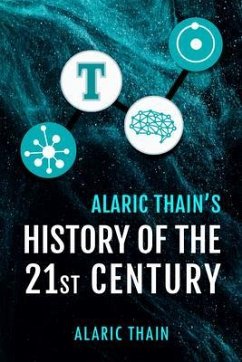Alaric Thain's "History of the 21st Century" recounts the events of the pivotal 21st century in a way that can be understood by people of the 29th century, who live in what could be considered a progressive utopia. Alaric Thain was born in 2064 but travelled extensively at relativistic speeds until he returned to Earth and wrote his seminal work in 2864. His point of view is unique, as he is able both to understand the motivations of 21st-century humans and explain them to 29th-century humans.
The "History of the 21st Century" is divided into three sections. The first section summarizes the history of humanity from the emergence of the species through to the dawn of the information age. By laying the foundations of primitive human thought, 29th-century readers can better appreciate the often perplexing motivations and reasoning of their ancestors. The second section looks at the history of the information age in detail, from its start, in 1998, to the closing of the last fossil fuel power plant in 2070, encompassing the "singularity", the American culture wars and the advent of fusion power. The third section explains three key archaic concepts that are typically difficult to understand for 29th-century readers: politics, economics and religion.
The History of the 21st Century tells a tale of drama and resolve, of trial and error, from the nearly disastrous experiments in populism typified by the presidency of Donald Trump to the heroism and nobility of people like Destiny Holt and Mukantagara Mporera. It was the vision and courage of leaders such as these that allowed us to weather the catastrophes that threatened us and achieve the "second enlightenment" by the end of the era.
The book has been brought to 2019 so as to provide an example to contemporary people of what might be the most favorable outcome imaginable, the one in which Alaric Thain had the opportunity to look back and write his history. Painfully aware of the extremely fortuitous events in his own timeline, he collaborated with Artie, the web-based artificial intelligence of his time, to bring about the publishing of his book over eight hundred years earlier, in August of 2019, with the intention of inspiring as many favorable futures as he could across the branching timelines of existence.
The "History of the 21st Century" is divided into three sections. The first section summarizes the history of humanity from the emergence of the species through to the dawn of the information age. By laying the foundations of primitive human thought, 29th-century readers can better appreciate the often perplexing motivations and reasoning of their ancestors. The second section looks at the history of the information age in detail, from its start, in 1998, to the closing of the last fossil fuel power plant in 2070, encompassing the "singularity", the American culture wars and the advent of fusion power. The third section explains three key archaic concepts that are typically difficult to understand for 29th-century readers: politics, economics and religion.
The History of the 21st Century tells a tale of drama and resolve, of trial and error, from the nearly disastrous experiments in populism typified by the presidency of Donald Trump to the heroism and nobility of people like Destiny Holt and Mukantagara Mporera. It was the vision and courage of leaders such as these that allowed us to weather the catastrophes that threatened us and achieve the "second enlightenment" by the end of the era.
The book has been brought to 2019 so as to provide an example to contemporary people of what might be the most favorable outcome imaginable, the one in which Alaric Thain had the opportunity to look back and write his history. Painfully aware of the extremely fortuitous events in his own timeline, he collaborated with Artie, the web-based artificial intelligence of his time, to bring about the publishing of his book over eight hundred years earlier, in August of 2019, with the intention of inspiring as many favorable futures as he could across the branching timelines of existence.
Dieser Download kann aus rechtlichen Gründen nur mit Rechnungsadresse in A, D ausgeliefert werden.








